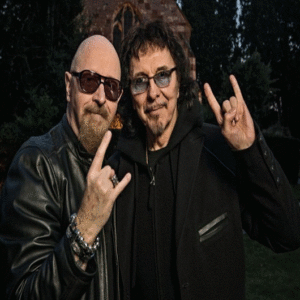
When two legends meet the skies shake and the gods revere the Metal masters. Here are excerpts of a joined Metal Hammer’s interview with Toni Iommi, The Dark Lord, and Rob Halford, The Metal God.
Rod Halford: “Escapism, trying to see what’s over the wall, is part of what drives you. You’d see other successful bands going to play in London, and it was such a big deal. It was only two hours away, but it was like another planet.”
Toni Iommi: “Coming from Birmingham, trying to break into London was like pulling teeth. They absolutely hated us. We had a gig at this famous club, The Speakeasy, and we died a death, ha ha. They didn’t ask us back.”R: “In those early days, we were both really f**king loud. We were turning up the volume. And volume used to scare people. When Sabbath and Priest first went to America, the volume we were using compared to everybody else was immense. There was always a little bit of fear and intimidation about the volume and size of heavy metal music. It was great, wasn’t it?”
T: “Ha ha ha! Except when you get to our age and you’re deaf.”
On the worst gig they played:
R: “We played anywhere you could put a plug in the wall. This one pub, the stage was literally three feet from the bar. There were these two guys having a pint, and we were all crammed up in this tiny corner. Glenn [Tipton, Priest guitarist] turns his guitar on and goes [makes strumming motion], ‘Pling’. The barman went, ‘That’s it, you’re not playing, here’s your fiver, now hoppit.’ We got paid without even playing a note.”
T: “We had to go to Europe to break it. We played in Hamburg and Switzerland, doing seven 45-minute spots every day. And there would be two people in – one of them was a hooker and the other a nutcase. We lasted about a day before the owners came up and said, ‘Stop that bloody racket!’”
R: “But those are great memories. At the time it’s s**t, but when you look back, it’s some of the best times of your lives. You’re a bunch of guys having a great time, playing your music.”
On the high hopes of becoming famous:
T: “For us, it was when the ‘Paranoid’ single came out and we were on Top Of The Pops. Nobody would play you on the radio. And journalists didn’t like us. We were hated. [Radio 1 DJ] Tony Blackburn hated the sight of us and he had to announce us on Top Of The Pops. It must have killed him.”
R: “I remember the day the postman delivered a copy of Priest’s first ever album, ‘Rocka Rolla.’ The record label would only give us one album each. I was still living with my mum and dad back then, and I remember signing for the package and taking it up to my bedroom and going, ‘This is it! It’s all gonna happen!’ Ha ha ha! Little did I realise that there would be another 10 years’ slog before it got to a really important place.”
On the crazy 1980s:
R: “[1980’s] ‘British Steel’ was the first album where people outside of our own country really started noticing Priest. I’m not saying America is the only place that’s worth breaking, but if you got played on the radio there it was a big part of building success.”
T: “The 80s was a big change for us. Ozzy went and we had Ronnie Dio come in. But it pushed us, it made us work harder. And even then we had a lot of people against us. Don Arden [Sabbath’s notorious manager and father of Sharon Osbourne] said, ‘You can’t have that, a midget singing for Black Sabbath!’ We had a lot of building up to do.”
R: “Ha ha ha! Well, for me, not a lot. I was down the Rainbow every night, coke up the nose.”
T: “Same as me.”
R: “I read Tony’s book and he went there, too. It’s a combination of peer pressure and the insidious nature of drugs and booze. You get to the point where it suddenly controls your life. I used to go onstage out of my skull.”
R: “I think we lost our way a little bit, musically. We got caught up in a lot of the things that were going on around us. For Priest, it was the ‘Turbo’ album, which became the black sheep of the family. These days, people listen to it and go, ‘That ain’t a bad tune.’ But at the time it was, ‘Is that metal enough?’ But you’ve got to take risks. And for me, the 80s for Priest was a lot of that – a lot of adventure and experimentation.”
T: “It was tough for us, too. But I never thought of giving up. That’s why I’m the only one who has always been there. Everybody else came back at some point or other. Ozzy came back, Ronnie came back, Geezer came back.”